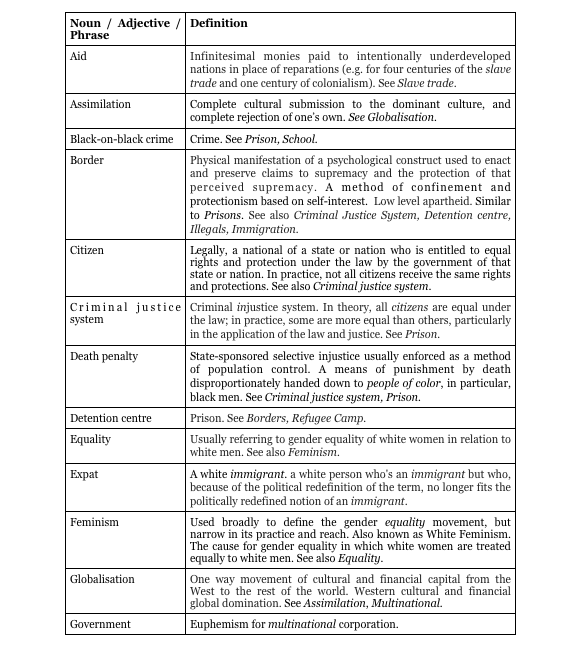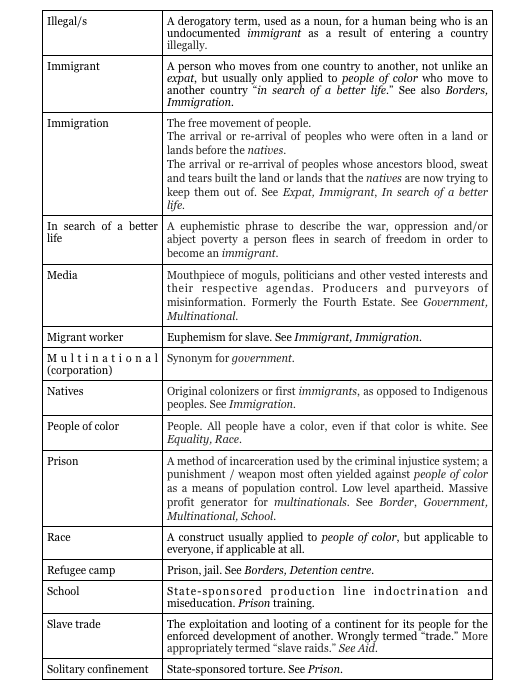A Dictionary for Our Times: Redefining the Language that Robs Us

by Sylvia Arthur
“Political language […] is designed to make lies sound truthful and murder respectable, and to give an appearance of solidity to pure wind.” —George Orwell
*
We need a new language or, in its place, we need a new dictionary.
I’m in the process of writing a book. It goes without saying that words, how they’re used and arranged, are fundamental to this practice, which I’ve been engaged in for over five years. In the course of this work, I’ve been forced to consider the weight of the words I choose and the intention behind selecting one unit of language over another. I’ve become conscious of the hidden meaning behind the language. Why am I choosing this word over that one? What do I intend for it to convey? What are the implications of using this term? I’ve spent hours, days and weeks, even, searching for the right word since many of the terms we use, often without thinking, are codified and in need of decryption.
Take, for example, the noun American. It’s generally assumed that an American is a person of white European heritage. If that weren’t the case, qualifiers would be redundant. I’ve often heard President Obama’s parentage described like this: “His father’s Kenyan and his mother’s American.” In today’s multicultural, multiethnic society, the fact that his mother’s American means nothing without clarification. Is she Caucasian-American, Asian-American, African-American, Latino-American, Indigenous or other? None, of course. She’s simply American, white American.
Similarly, the phrase “White Trash.” Why do we (still) prefix trash with white if not to highlight the exceptional case of an individual who happens to be white and trash, unlike all the other unexceptional trash, which is just trash - not Black trash or Latino trash, Asian trash or Indigenous trash, just trash?
Language is power. It’s also a tool of the powerful. Its appropriation by the political class has robbed us, the people, of a vocabulary that has retained its integrity. The lexicon and semantics of English as used today is designed to deliberately exclude, obfuscate, belittle and oppress. It’s purposefully circuitous. Words are wielded like weapons to subdue the masses for political ends.
This is nothing new. The English essayist, George Orwell, wrote over half a century ago: “In our time, political speech and writing are largely the defence of the indefensible. Things like the continuance of British rule in India, the Russian purges and deportations, the dropping of the atom bombs on Japan, can indeed be defended, but only by arguments which are too brutal for most people to face, and which do not square with the professed aims of political parties. Thus political language has to consist largely of euphemism, question-begging and sheer cloudy vagueness.”
Given the European refugee (not migrant) crisis, the US immigration (not illegals) debate, the McGraw-Hill textbook scandal over (not migrant workers but) slaves and Raven-Symone’s bizarre assertion about Black (Watermelondrea, anyone?) names, it seems now is the time for some much-needed clarity.
So in place of a new language, here’s a new dictionary that could very well end up being the glossary of my soon-to-be-finished book. Feel free to add your own definitions in the comments below:


Sylvia Arthur is a Black British writer who is working on a book about her journey through Europe against the backdrop of evolving European identity. Follow her work at sylviaarthur.wordpress.com.
No comments: